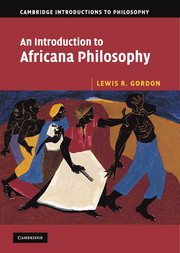
-
Select format
-
- Publisher:
- Cambridge University Press
- Publication date:
- June 2012
- May 2008
- ISBN:
- 9780511800726
- 9780521858854
- 9780521675468
- Dimensions:
- (247 x 174 mm)
- Weight & Pages:
- 0.73kg, 288 Pages
- Dimensions:
- (247 x 174 mm)
- Weight & Pages:
- 0.58kg, 288 Pages
You may already have access via personal or institutional login
Book description
In this undergraduate textbook Lewis R. Gordon offers the first comprehensive treatment of Africana philosophy, beginning with the emergence of an Africana (i.e. African diasporic) consciousness in the Afro-Arabic world of the Middle Ages. He argues that much of modern thought emerged out of early conflicts between Islam and Christianity that culminated in the expulsion of the Moors from the Iberian Peninsula, and from the subsequent expansion of racism, enslavement, and colonialism which in their turn stimulated reflections on reason, liberation, and the meaning of being human. His book takes the student reader on a journey from Africa through Europe, North and South America, the Caribbean, and back to Africa, as he explores the challenges posed to our understanding of knowledge and freedom today, and the response to them which can be found within Africana philosophy.
Reviews
'Gordon's introduction to Africana philosophy is a broad interdisciplinary invitation to students and philosophers to engage in a critical reflection on the 'human condition' in Africa and the African diaspora. Students who have taken my class in African philosophy have greatly appreciated his lucid style as well as the historical and thematic analysis of the key concepts and influential scholars that have defined Africana philosophy and mapped out future orientations. it is indeed a historical introduction that works well in the classroom.'
Elias Kifon Bongmba - Harry and Hazel Chavanne Chair in Christian Theology, Rice University and President, African Association for the Study of Religion
Contents
Metrics
Altmetric attention score
Full text views
Full text views help Loading metrics...
Loading metrics...
* Views captured on Cambridge Core between #date#. This data will be updated every 24 hours.
Usage data cannot currently be displayed.
Accessibility standard: Unknown
Why this information is here
This section outlines the accessibility features of this content - including support for screen readers, full keyboard navigation and high-contrast display options. This may not be relevant for you.
Accessibility Information
Accessibility compliance for the PDF of this book is currently unknown and may be updated in the future.


